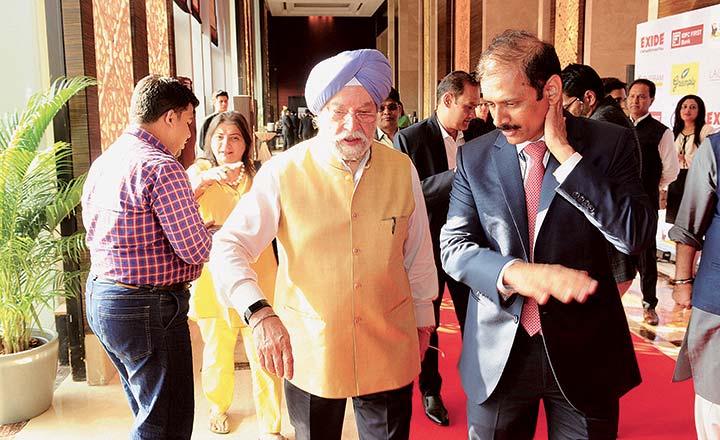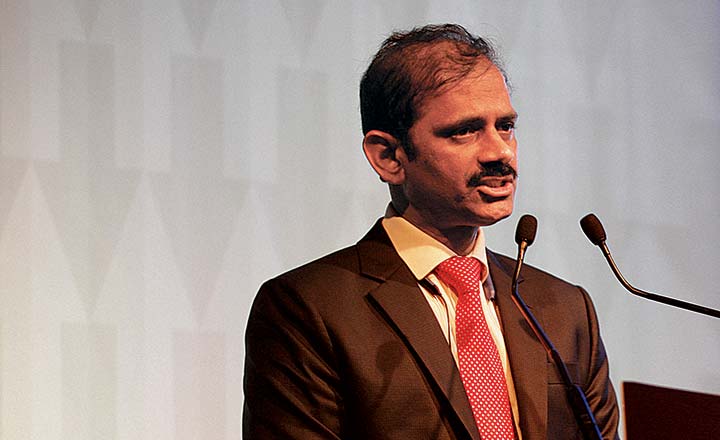If you have turned on the television any day over the past few months, between 8 pm and 10 pm, and tuned into a news channel, you would have definitely noticed five to six talking heads, all talking (individually or even together) about the ongoing economic slowdown or a related topic. That’s the first thing V Vaidyanathan, CEO, IDFC First Bank observed when he took the stage at Outlook Business Leading Edge 2019. It’s the elephant in the room wherever you go. And India is not alone. Global growth forecasts are anything but upbeat. Some of the brightest nations are stuck in low gear.
“Slowdown is on everyone’s mind these days and people are keen to understand if it’s for real and how long it’s going to last,” he added before sharing his take on the economic downturn. It’s not as black and white as one would think. India saw a lot of slowdown-like situations between 2010 and 2015 — GDP was falling quarter on quarter, fiscal deficit was high near 6% and oil prices were on the boil above $100/barrel. And in the midst of all that, there was also a surge in credit, especially to companies operating in roads, infrastructure and power sectors.
“But the cycle played itself out only after 2015. Hence, when a cure (Insolvency and Bankruptcy Code) was announced, most public sector (PSU) banks, along with a few private banks, had to take on significant losses,” he said. Nearly Rs.8 trillion was written off by PSU banks. “If that money had been invested in road infrastructure or growth, we would be smiling at a very different economy today,” added Vaidyanathan.

The CEO of the bank said that we are now paying for our past excesses. “Issues in the financial services sector come with a lag and you cannot ignore the excess of credit in 2010-2015. Now, the whole nation is paying the price,” he said.
Vaidyanathan said that the current establishment’s reform efforts are shrinking India’s harmful parallel economy. And naturally, every transition comes with short-term pain, citing the example of the 1991 liberalisation. “Back then, Indian manufacturers initially lobbied against it because they didn’t want to share the market with foreigners. Some couldn’t compete, but the ones who survived came out stronger,” he added. He believes the pain of reforms such as demonetisation and Goods and Services Tax will start paying off eventually.
He supported his argument with the J-curve theory, one that says that the initial negative impact of any reform will give way to exponential gains later. “So, we are yet to see many benefits and we will grow well over the next two decades,” he said, confidently adding that we will be a developed economy in the end.
But how are companies dealing with the slowdown right now? Vaidyanathan said that not every company is in the throes of a slowdown. For instance, while several NBFCs have been struggling, a few have continued to thrive. “They must have done something different by managing to conduct themselves well and run good businesses,” he said. These companies were prudent and well-capitalised, raised equity at the right time, focused more on retail financing and, most importantly, stuck to good corporate governance. Thus, they are growing at an average of 25%, he said. As compared to them, certain NBFCs ran into trouble by financing developers and exposing their books to debt-laden realtors. “They started running asset-liability mismatch and were not raising enough capital. These are the companies that are in trouble today,” he said.
Being prepared is a principle close to his heart. He recalled three conversations, one with a tubes manufacturer, another with a glycols producer and the last with paints company Asian Paints. All three are successfully battling the slowdown only because they were ready for a setback. The banker asserted that one has to be ready for a slowdown even when you are enjoying the comfort of a great economy. For instance, at Capital First, the NBFC that was merged into the present private bank IDFC First Bank, real-estate exposure was at Rs.27 billion and retail loan book was worth Rs.940 million in 2012. In five years, the former was reduced to Rs.5 billion and the latter increased to Rs.300 billion because they consciously moved to reduce exposure to high-risk developers. He shared that the Capital First-IDFC Bank merger’s roots came from this determination to be prepared. “I kept thinking to myself: what if we run out of money? Could we look at a banking licence,” he asked himself then and his questions were answered when IDFC Bank opened itself up for a merger. The rest, as we all know, is history. The bank has been seeing robust growth in retail deposits and CASA addition.
In line with the theme of the event of “Never Waste A Slowdown”, Vaidyanathan reminded a room full of entrepreneurs and leaders that our start-up ecosystem is booming. Why? Because of opportunities — across every sector in this country — from healthcare, education and digital payments to financial services and logistics. Calling it a new economy, he marveled, “Startupreneurs have created an entire different ecosystem and have only seen an upward trajectory.” He implored the leaders to take notes from the burgeoning enterprise and learn to be flexible and adapt. For those who can’t, there’s always the option of following the basic protocol — keep your head down, cut cost and simply brave the cycle. “We can pivot or we can hunker,” said the banker as he ended his address on an optimistic note saying, “good days will return.”











